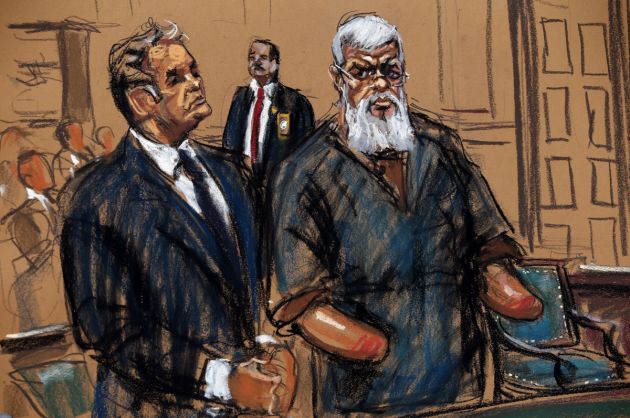Militant Islamic cleric faces US trial on terrorism charges

NEW YORK (Reuters) - U.S. prosecutors will aim for a second high-profile terrorism conviction in weeks when a one-eyed, handless Islamic cleric known for fiery speeches goes on trial on Monday on charges that he provided support for al Qaeda in Afghanistan.
The government has also accused Abu Hamza al-Masri of conspiring in a 1998 kidnapping of tourists in Yemen that resulted in the deaths of three Britons and an Australian, and trying to set up a training camp in Oregon.
The Egyptian-born preacher, who faces life in prison if convicted, told a judge at a pretrial hearing on Wednesday that he is innocent.
The trial, which is expected to last about a month, comes less than three weeks after a jury in the same New York courthouse convicted Suleiman Abu Ghaith, one of Osama bin Laden's sons-in-law, of terrorism-related charges.
The Abu Ghaith verdict prompted a visit by Attorney General Eric Holder to New York, where he told reporters the case should help end the debate over whether militants should be tried as criminal defendants in civilian court or as combatants in military tribunals.
Abu Hamza, 55, was extradited in 2012 to the United States from Britain, where he had been jailed for inciting followers to kill non-believers after operating a mosque that British authorities said was a breeding ground for Islamist militancy.
Under the terms of British and European court rulings authorizing his extradition, he must be tried in civilian court.
The imam, who in court is using his birth name, Mustafa Kamel Mustafa, is missing an eye and both hands, injuries he says took place while he was carrying out humanitarian work in Afghanistan in the 1980s. In London, he became known for wearing a metal hook on one arm.
Authorities say he sustained the injuries fighting for the mujahideen against the Soviet Union.
CONTACT WITH 'SHOE-BOMBER'
A powerful orator, Abu Hamza had contacts with several well-known militants at the Finsbury Park mosque in north London mosque, according to British officials, including Briton Richard Reid, who unsuccessfully tried to blow up a Miami-bound airliner with explosives hidden in his shoe in 2001.
Prosecutors have accused Abu Hamza of helping militants in Yemen take 16 tourists hostage in 1998 by providing them with advice and a satellite phone. Four of the hostages were killed when the Yemeni military launched a rescue mission.
In 1999, the government says, Abu Hamza conspired to create a militant training camp in Bly, Oregon. In 2000 and 2001, prosecutors say, Abu Hamza used money he raised at his mosque to help militants travel to Afghanistan while exhorting his followers to donate to Taliban-backed programs there.
As part of their case, prosecutors plan to employ Abu Hamza's own incendiary words against him. At a hearing this week, they told U.S. District Judge Katherine Forrest they intend to play for the jury a series of recordings of Abu Hamza praising bin Laden and castigating Jews, Christians and homosexuals.
Abu Hamza's defense lawyers argued that the recordings have little relevance to the charges against him and will inflame the jury.
In a handwritten letter to Forrest in February, Abu Hamza said he planned to testify in his own defense.
On Wednesday, at the final pretrial hearing, Forrest asked Abu Hamza whether he understood that he could seek a plea deal if he is guilty and does not want to proceed to trial.
"I think I'm innocent," he told the judge, saying the trial represented "a chance to defend myself."
The government also plans to call as a witness former al Qaeda operative Saajid Badat, who plotted with Reid to blow up airplanes before Badat backed out at the last minute. Prosecutors say Badat would testify that Abu Hamza ordered him and another man to travel to Afghanistan for training.
Badat previously pleaded guilty and agreed to cooperate with British authorities, serving six years in prison in Britain. He has testified at two terrorism-related trials in the United States, including that of Abu Ghaith.
In both, he appeared via closed-circuit television after refusing to travel to the United States, where he remains under indictment in Massachusetts for the shoe bomb plot.
Forrest has not decided whether to allow him to testify on video after he again declined to come to New York. In a letter to Forrest on Wednesday, prosecutors said Badat would be arrested if he entered the United States.
(Reporting by Joseph Ax; Editing by Noeleen Walder and Mohammad Zargham)
